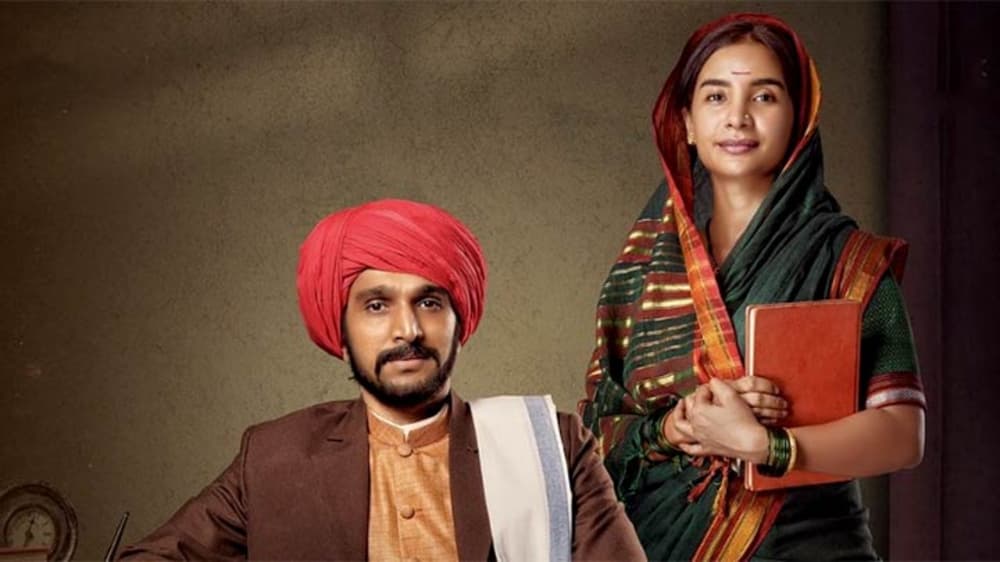Phule (2025) is a biographical drama that tells the inspiring story of Jyotirao and Savitribai Phule, pioneers of social reform in 19th-century India. Starring Pratik Gandhi and Patralekhaa, the film highlights their fight for women's education and against caste discrimination, set against the backdrop of a society resistant to change.

Phule (2025) is the highlight new OTT release among others, having a beautiful and emotional insight into two of India's best-known social reformers. Based on the director's Ananth Narayan Mahadevan's experience, it describes the life journeys of Jyotirao and Savitribai Phule, actored by Pratik Gandhi and Patralekhaa, who resisted hardened caste and sex discrimination during Maharashtra in 19th century.
Amidst the shadow of oppression and raging plague, the movie chronicles their bitter struggle for education, equality, and social justice. Through compelling performances and an emotionally powerful narrative, Phule pays tribute to a revolutionary duo whose legacy continues to inspire generations.
Phule (2025): A Quiet Revolution Told with Grace and Grit
Phule (2025) begins with the bubonic plague epidemic at Pune, 1897, and sets a somber atmosphere that encapsulates the life and work of Jyotirao and Savitribai Phule. The film looks back to their early days of struggle in highly caste-segregated and patriarchal society. Visionary social justice activist Jyotirao (Pratik Gandhi) and bold in the quest for knowledge Savitribai (Patralekhaa) take a decision to join hands to take up a rebellious path to empower the marginalized.
Despite constant social opposition, humiliation, and even betrayal by relatives, the Phules stand their ground. They establish India's first girl school, struggle for the rights of widows and lower castes, and set the stage for future social movements. The story follows their bravery, the emotional strain of their struggle, and the strength of their marriage.
As the plague infects, the film comes back to the supreme act of devotion of Savitribai — sacrificing her life to save lives — and illustrates the spirit of sacrifice and rebirth that had been their testament. Phule, in action-packed scenes and heart-wrenching dialogues, shows a motivational image of two visionaries who had dreamed of a just world.
Phule: A Quiet Revolution Told with Grace and Grit
Phule, which is helmed by Ananth Narayan Mahadevan, is a highly respectful biographical drama that hopes to educate and inspire, throwing light on the lives of two of India's best-known social reformers — Jyotirao and Savitribai Phule. Though not immune to its filmmaking shortcomings, the movie is an emotional narration with great performances, and hence it is a worthy addition to Indian historical cinema.
Performances: Heart and Soul of the Film
Pratik Gandhi is Phule's emotional hub. His subtle, intelligent portrayal of Jyotirao is so unforced and enthralling. He brings the character to a serene wisdom with raging passions, with equal amounts of intellect and sensibility, as he's perfectly balanced in his portrayal.
Whether he's denouncing social injustice or pacifying his friend with gentle comfort, he's like electricity to observe.
Patralekhaa delivers one of the finest performances of her life. Savitribai, as she plays it, epitomizes the courage, generosity, and unwavering resolve of a woman miles ahead of her time. Her chemistry with Gandhi is authentic and spontaneous, depicting a bond formed owing to respect and commitment.
Vinay Pathak and Darsheel Safary, who play supporting roles, do decent justice, though they are not given much to do.
Direction & Tone: Firm but Secure
Mahadevan's direction is restrained and dignified, fitting the subject matter. He shuns sensationalism — a decision to be applauded — but the restraint occasionally distances the film emotionally. Additional cinematic tension or inventive visual metaphors could have been injected into the narrative to amplify climactic scenes.
The tone is respectful throughout, as is appropriate for a biopic of this sort, but sometimes leans towards being overly somber. For a tale filled with so much fiery bravery, the film far too often ends up being too subdued.
Visuals & Production: A Modest Yet Authentic Canvas
The production design keeps 19th-century Maharashtra in earthy realism — dusty roads, humble abodes, candlelit classrooms. The cinematography is functional but nondescript, serving the story without ever standing out. The costume design and details are authenticity reflected, anchoring the film to reality in its setting.
Music & Sound: Subtle Support
The music is understated and used sparingly in the background, supporting the film's emotional tone without overwhelming it. There are no large musical set pieces, consistent with the low-key nature of the film. This renders restraint, even if perhaps possibly frustrating to some viewers who would be looking for a more emotionally intense score.
Themes & Impact: Still Relevant Today
In its essence, Phule is a story of revolution through pity, learning as strength, and courage to counter three centuries of repression. These are issues whose veracity is frighteningly contemporary even today, and the best work that this film does is remind us of how much was achieved by silence, determination-supported fortitude.
It also throws long-overdue light on Savitribai Phule, whose career is usually overshadowed, and celebrates her role not as secondary partner but as revolutionary force.
Conclusion
Phule is not the most cinematic biopic ever, but it is one of the most essential. It chooses simplicity over spectacle, respect over drama, and truth over exaggeration. While it is lacking in narrative panache and can be slow at times, it gets it right where it matters most — in narrating the story of two visionaries who defined India's conscience.